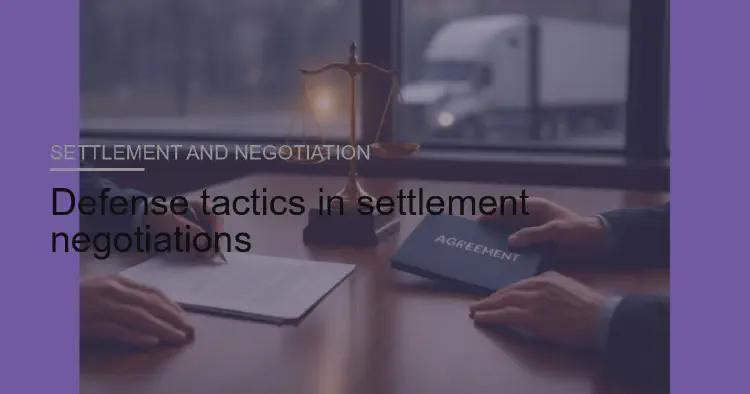Defense tactics in settlement negotiations
Defense attorneys and insurance companies representing trucking companies often use strategic tactics during settlement negotiations to minimize payouts or shift liability away from their clients.
- Truck Accident Law Team
- 2 min read
Article 4 of 6 in Settlement and Negotiation/

Defense Tactics in Settlement Negotiations for Truck Accident Cases
1. Lowball Initial Offers
- Defendants often start with very low settlement proposals to test the plaintiff’s willingness to compromise.
- Strategy: Anchor negotiations at the lowest possible level.
2. Delaying Settlement Talks
- Stretching out negotiations to pressure financially struggling victims into accepting less.
- Tactics may include requesting excessive documentation or prolonging responses.
3. Disputing Liability
- Arguing the truck driver was not negligent or that another party (plaintiff, third-party contractor, government entity) shares responsibility.
- Attempting to reduce or eliminate payout obligations.
4. Challenging Damages
- Claiming medical treatments were unnecessary or unrelated to the accident.
- Downplaying pain and suffering or emotional distress.
- Using defense experts to contradict plaintiff’s experts.
5. Using Comparative or Contributory Negligence Laws
- In states with comparative negligence, defendants argue the plaintiff shares significant fault to reduce damages.
- In contributory negligence states, even minor plaintiff fault may bar recovery entirely.
6. Confidentiality and Release Demands
- Defendants may require broad confidentiality agreements to prevent publicity.
- Settlement offers often include sweeping liability releases protecting multiple parties.
7. Threatening Trial Risks
- Suggesting that a jury may award less than the settlement offer.
- Emphasizing uncertainties in proving damages or liability.
8. Structured Settlement Proposals
- Offering long-term structured payments instead of a lump sum, which may benefit the insurer more than the victim.
- Plaintiffs must carefully evaluate the true financial impact.
Legal Significance
- Recognizing these tactics helps plaintiffs’ attorneys prepare effective counterstrategies.
- Strong evidence and readiness for trial weaken the effectiveness of defense negotiation strategies.
Summary: Defense teams in truck accident cases commonly use delay, denial, and minimization tactics to reduce settlements. Plaintiffs who anticipate and counter these strategies are better positioned to secure fair compensation.
You might also like:
- Tags:
- Comparative Negligence
- Truck Driver
- Contributory Negligence
- Strong Evidence
- Legal Significance
- Pain Suffering
- Plaintiffs Attorneys
- Settlement Negotiations
- Confidentiality Agreements
- Negligence States
- Settlement Offers
- Multiple Parties
- Emotional Distress
- Negligence Laws
- Defense Tactics
- Structured Payments
- Negotiation Strategies
- Lump Sum
- Suffering Emotional
- Contributory Negligence States
- Pain Suffering Emotional
- Suffering Emotional Distress
- Treatments Unnecessary Unrelated
- Comparative Contributory Negligence
- Contributory Negligence Laws
- Unnecessary Unrelated Accident
- Bar Recovery Entirely
- Fault Bar Recovery
- States Comparative Negligence